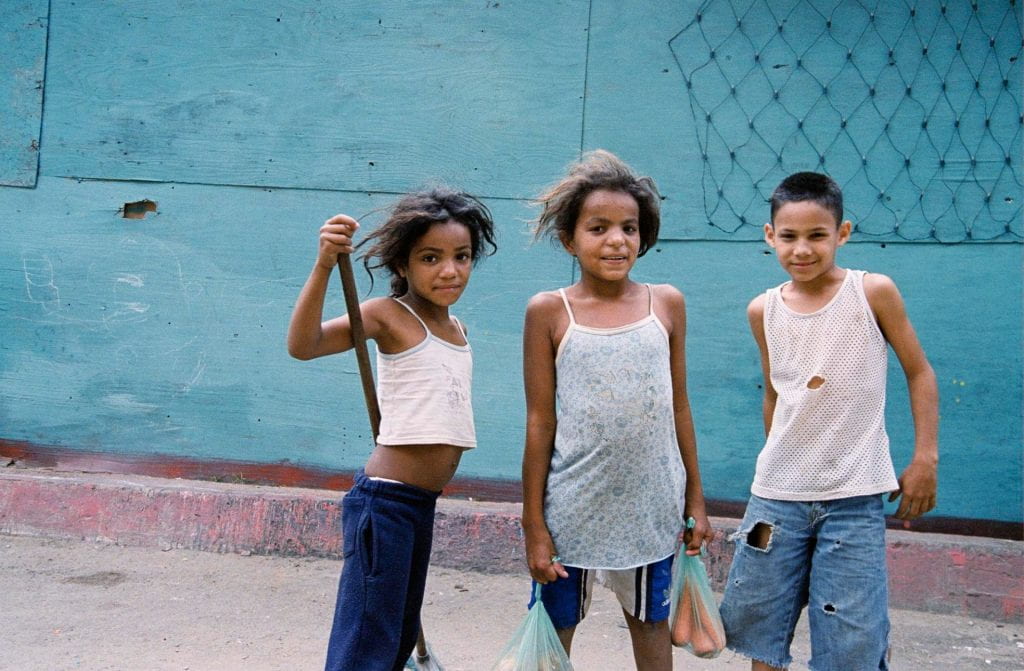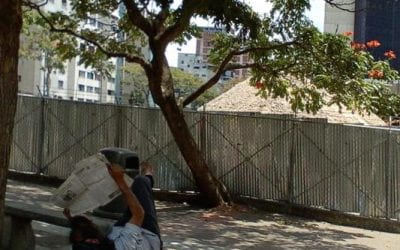Social Policy in Chávez’s Venezuela
A Radical Alternative or More of the Same?

Residents of urban barrios have benefited from programs such as the Soup Kitchen not only in terms of material gains, but also in terms of the personal sense of empowerment that results from involvement in community-based work. Photo by Marcos Barbery
The barrio Carretera Negra on the western edge of Caracas consists of a row of houses along a stretch of highway road, as indicated by its name, “Black Highway,” and along three smaller lanes, Oriente, 24 de Julio and Justicia. It is a Wednesday morning in the Carretera, and police officer Osvaldo Mendoza is unloading foodstuffs from the back of a government truck for the local soup kitchen, located in the front room of his house. “I was never a vecino (neighbor) who was very involved with the community because of my work,” Osvaldo told me. “But seeing the necessities of our communities, what I’ve seen as a police officer, the necessities you see in the streets, I offered my house when this opportunity came.”
By midday, five local volunteers have prepared the meal of potato salad, hot dogs, and beans and rice that feed 150 children daily. School children in white and blue uniforms wait in a long line outside bearing plastic containers, and the food is packed into their containers by volunteers and then stored in school bags.
The soup kitchens function through the organization and labor of the vecinos, but they are an initiative of President Hugo Chávez. Since Chávez was elected to office in 1998 in Venezuela, he has sparked both acclaim and controversy for his interventions on behalf of the poor.
For nine months between January 2004 and January 2007, I lived in one of the popular barrios of Caracas, carrying out field research for a project on urban social movements. I witnessed health clinics in the highest reaches of the shantytowns where previously people had died from preventable diseases; nutritious daily meals available for children from poor families; and high-school dropouts continuing their schooling during evenings in the work-study program. But from my own observations, it seemed that these programs faced some challenges in their implementation, including the siphoning off of stipends that sometimes didn’t reach intended beneficiaries; hoarding and pilfering of goods; and under-employment, where people were employed in the various missions, but at times remained without a livable wage.
But in order to put what I witnessed into context, one must first understand the evolution of social policy in Venezuela and, in particular, during the Chávez government. To what extent has Chávez managed to reverse the free market economic reforms of the 1990s and usher in a new era? Is his government simply reframing older policies in the cloak of a nationalist and populist discourse? What are the continuities and ruptures with his predecessors? What difference has his government made for the residents of marginalized barrios like the Carretera Negra? This article will examine these questions through a discussion of social policy in a Chávez era.
Social Policy Prior To Chávez
After the collapse of the military dictatorship in 1958 and the transition to democracy, the new Acción Democrática (AD) government pursued strategies of Import Substitution Industrialization (ISI) and prioritized social welfare. But the debt crisis of 1983 brought a decade of growing poverty, unemployment and inflation. Venezuelan leaders began courting foreign investors and borrowing to maintain social spending.
During the 1990s, under the second term of President Carlos Andres Pérez, neoliberal reforms were introduced. In his February 2, 1989, inauguration speech, the newly elected Pérez railed against the International Monetary Fund (IMF) and other international lending organizations, but just a few weeks later he announced a neoliberal policy packet known as El Gran Viraje—the great turnaround. Under pressure from foreign creditors to implement an IMF-style austerity program, he dismantled protections, deregulated prices, and reduced social spending.
Social policy under Pérez’s neoliberal framework was reoriented from its emphasis on providing equity, universal access to social welfare and redistribution towards the privatization of social services and compensatory programs designed to mediate the effects of the neoliberal reforms. Pérez’s social policy was encapsulated in the program Plan de Enfrentamiento de Pobreza (PEP), which included a Mother-Infant Nourishment program, School Nutrition Programs, Youth Training and Employment, Day Care Centers, Programs of Assistance in Popular Economy, a Project of Urban Improvement in the Barrios, and a Program of Local Social Investment, among others.
Under a second phase of social policy, in 1992, Pérez implemented the Mega Proyecto Social. The Mega Proyecto Social complemented the PEP, providing investment in areas such as water infrastructure, education, health, housing, social security and environment. But funding for the program was markedly reduced and social services were outsourced to non-governmental organizations (NGOs). In a time of limited public resources, the burden for subsistence and welfare was shifted onto social sectors.
Under the next president, Rafael Caldera (1994–1998), the PEP was replaced by a new social program, the Plan de Solidaridad Social, launched in 1994. The plan attempted to combat poverty through constructing a healthy economy that would reduce unemployment and increase salaries. Caldera revived the neoliberal agenda in April 1996 in consultation with the IMF, as a program of macroeconomic stabilization known as Agenda Venezuela, although no formal agreement was signed with the IMF.
But these social programs had little effect in mediating the impact of neoliberal structural adjustment. Compensatory programs were short-term and targeted small sectors of the population. By 1997, greater foreign investment and a rise in oil prices allowed for economic growth, but social indicators did not improve. By 1997, the official rate of unemployment was 12 percent, inflation had reached 103 percent, and real incomes had fallen by 70.9 percent since 1984, as Héctor Silva Michelena describes in his chapter on Venezuelan social policy in the ‘80s and 90s (in Lourdes Alvares, Helia Isabel del Rosario, and Jesús Robles (eds), Política Social: Exclusión y Equidad en Venezuela Durante los Años Noventa, Nueva Sociedad, Caracas, 1999, pp 85 – 114).
Chávez’s Early Years In Office: 1998 – 2001
Hugo Chávez was elected in the December 1998 general elections mainly because of his proposals to make a transition away from the neoliberal model. Soon after taking office, Chávez initiated the process of rewriting the constitution. Many of those elected to the constituent assembly had been human rights advocates under previous governments, and they incorporated a broad concept of human rights as both civil rights and social rights of public health, education, and welfare. The new constitution was completed over the next few months and approved by referendum in December 1999.
However, despite his anti-neoliberal rhetoric and legislation, during his first period of office Chávez followed many of his predecessors’ policies. Initially, there was a strong emphasis on short-term macroeconomic policies of fiscal discipline and monetary control, practically identical to those pursued under the Agenda Venezuela. In July 1999, the Chávez government announced the ratification of nine of the fourteen social programs of Agenda Venezuela.
In his Plan Bolívar announced in 2000, Chávez proposed short-term civic-military interventions to address the most urgent social problems. There was also a move to centralize social programs within large state ministries, as Norbis Mujica Chirinos observes (“Caracterización de la política social y la política económica del actual gobierno venezolano: 1999 – 2004,” Revista Venezolana de Gerencia 12, no 1, Enero-Abril 2006: 31–57). Chávez’s early period was marked by a contradictory orientation that combined macroeconomic adjustment policies with compensatory social programs, in contrast to the model of development he had proposed.
During this period, the Chávez administration collaborated with the World Bank, which continued its social programs in Venezuela. Shifts were taking place within leading development institutions themselves, away from the more aggressive structural adjustment policies towards “inclusive” Poverty Reduction and Good Governance goals. The United Nation Development Programme (UNDP) proposed a set of Millennium Development Goals (MDGs) in 2000, which included the eradication of extreme poverty, universal primary education and the reduction of child mortality, among other goals. The idea was that economic growth resulting from neoliberal market integration would not by itself reduce poverty, and there would need to be a commitment from poor countries and their citizens to address social problems.
In December 2002, the World Bank proposed an Interim Country Assistance Strategy (ICAS) designed to help Venezuela meet the MDGs by 2015. This included a $60.7 million Caracas Slum Upgrading Project with the state institution Fundacomun. The WB also committed funds to public health services, urban transport and finance.
The Turnaround: Social Policy Post-2002
However, by 2002-2003, the Chávez government was ready to make a break with its predecessors’ social policies, including its ties to the WB and international agencies. This was partly related to the opposition’s attempted coup in April 2002, the work stoppage by oil executives from the state-owned oil company PDVSA on December 10, 2001, and the lockout a year later, which resulted in the dismissal of 18,000 employees. Following these events, Chávez took control of the oil company and made internal structural changes, giving his government more leverage over funds. The growing independence of the Chávez administration was also a consequence of the spectacular rise in oil prices, from US$24.13 per barrel in December 2002 to $84.63 in December 2007, that made more funds available to state coffers.
In July 2002, the government proposed a Plan Estratégico Social 2001-2007 (PES), which aimed to broaden social rights, reduce income inequality, and promote collective and public ownership. At the center of this new social policy were the missions, a comprehensive series of publicly funded and administered poverty alleviation programs. Two of the main goals of the missions were introducing universal education and health care. This was initially done by bypassing the established institutions and setting up programs in the barrios through a parallel set of institutions. The missions were introduced at the time when Chávez was facing a recall referendum, leading some to see them as part of an electoral strategy.
The key educational missions included adult literacy and elementary education programs Mission Robinson I and II, work-study program Mission Ribas, and a university program, Mission Sucre. Unemployed and informal groups were incorporated into these programs in large numbers as both instructors and students, helping to partly alleviate poverty by providing them with small stipends for their involvement.
In mid-2003, Chávez introduced the Barrio Adentro program of local health clinics, staffed by Cuban doctors, in 320 of Venezuela’s 335 municipalities. By mid-2005, he had added another two programs, Barrio Adentro II and III for additional medical services. In March 2005, there were over 5,000 Health Committees, which were created to supervise and help out with the Barrio Adentro program.
In addition to educational and health programs, Chávez encouraged barrio residents to create a range of committees and cooperative organizations. In a 2002 executive decree, Chávez established the basis for Urban Land Committees, in order to redistribute and formalize land deeds. Since most dwellings in the barrios were constructed through a process of massive squatting as people moved to urban centers from the countryside, few home owners possessed deeds or titles to their land. In March 2005, there were more than 4,000 Urban Land Committees in the urban capitals of Venezuela, which had distributed about 170,000 property titles.
The Chávez government also set up soup kitchens, where needy children and single mothers from the barrios received one free meal a day. During 2004, there were 4,052 soup kitchens established in Venezuela. Mission Mercal was a series of subsidized supermarkets also designed to improve nutrition.
The Balance Sheet
So what is the balance sheet for the Chávez government? Despite problems with implementation and other limitations to Chávez’s social policy proposals, there have been significant departures from previous Venezuelan governments and from the MDGs proposed by international agencies and foundations.
In a talk at Brown University in February 2008, political scientist Julia Buxton argued that the development agenda of the Chávez government emphasizes sustainable economic growth based on technological innovation, macroeconomic policy management and basic social services provision. Fiscal and monetary policies are compatible with social policies. There is a disproportionate focus on the poor and a redistribution of assets and land. Buxton suggested that all of these factors differentiate the agenda of the Chávez government from the targeted poverty reduction approach associated with MDGs, which still retain a jaundiced view of the state, focus on private sector and trade led growth, measure development by economic and not social indicators, and lack any emphasis on land redistribution.
Under Chávez, there has also been an attempt to divide up the national territory. Post-2002 social policy focused on creating a protected zone where the welfare apparatus could be cushioned off from global markets. Funds are channeled directly from PDVSA to the various missions. PDVSA manages a yearly fund of some US$2,000 million from oil revenue, all of which is all channeled into social programs. But other zones continue to function with foreign and private capital, in varying degrees, including culture and communications, mining and hydrocarbons, and the manufacturing sector.
In conclusion, in a Chávez era, we see both continuities and ruptures with the past. In the field of social policy, the Chávez government has managed to create an alternative system of welfare intervention and redistribution that conflicts with the neoliberal policies of his predecessors. At the same time, the Venezuelan economy continues to be dependent on a boom-bust cycle of fluctuating oil rents and an export-oriented model of development, and it faces unfavorable external conditions due to the strength of IMF conditionalities and fiscal austerity policies across the rest of the continent. It is unclear whether Chávez’s policies are actually creating an anti-neoliberal challenge that could counter the strength of the global market.
For many residents of the urban barrios, such as the Carretera Negra, programs such as the Soup Kitchen have brought immeasurable changes to their lives, not only in terms of material gains, but in terms of the personal sense of empowerment that results from involvement in community-based work. Carmen Teresa, one of the women involved in the organization of the soup kitchen summed it up: “I am forty-something years old, and never in my life have I cared about what was happening in my country, and I’m saying my country, but also my Carretera where I live. It’s like I am fulfilled. This work fulfills me. I want to be involved in everything, I want to participate in everything, I really feel that someone needs me and I can do it.”
Related Articles
Editor’s Letter: Venezuela
Long, long ago before I ever saw the skyscrapers of Caracas, long before I ever fished for cachama in Barinas with Pedro and Aída, long before I ever dreamed of ReVista, let alone an issue on Venezuela, I heard a song.
Elections and Political Power: Challenges for the Opposition
English + Español
Next month’s elections will be an important benchmark in Venezuelan politics. On November 23, voters will go to the polls to elect 22 state governors and 355 mayors in as many municipalities, as well as choose the mayor of Caracas. The elections are taking place in a political environment influenced by the abrupt proclamation of 26 laws on July 31, the last day of President Chávez’s 18-month powers to issue emergency decrees …
A Review of Tramas del mercado: imaginación económica, cultura pública y literatura en el Chile de fines del siglo veinte
Luis Cárcamo-Huechante’s new book provides us with a convincing counter-narrative, at once nuanced and succinct, to three mainstream narratives of the neoliberal free market in Chile: those of monetarist economics, promotional politics, and literary bestsellers. It covers the Pinochet dictatorship (1973-90) and the transition to democracy from its official inauguration in 1988, with the victory of the Yes vote for a return in two years’…




